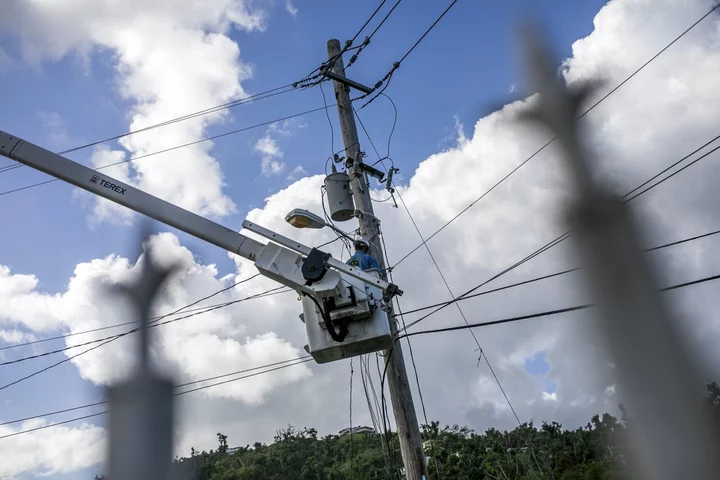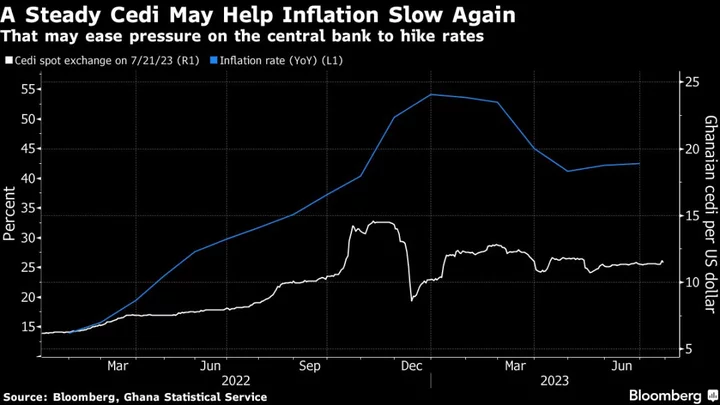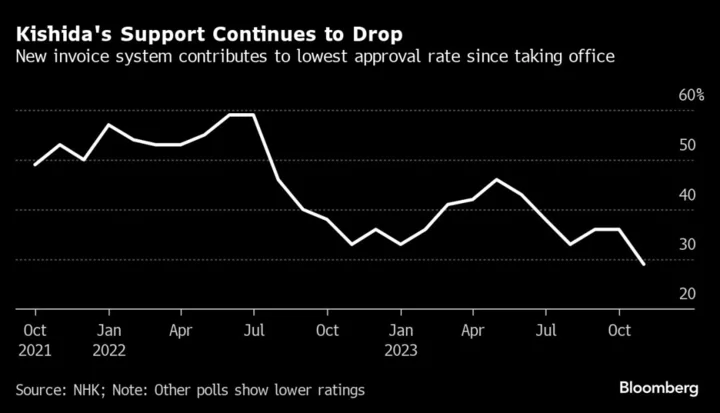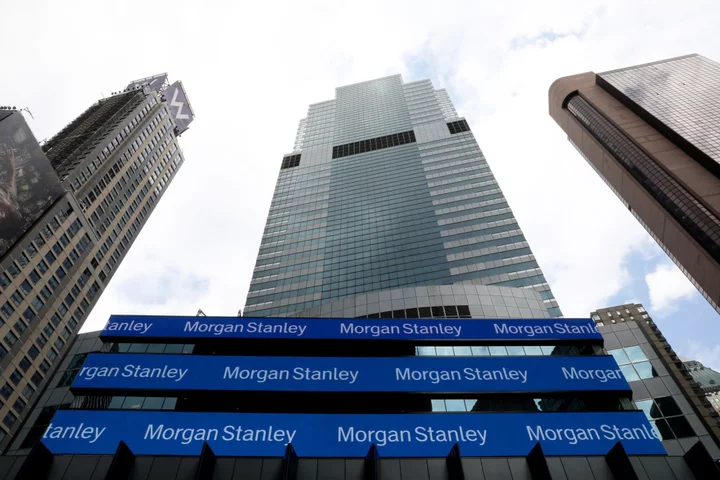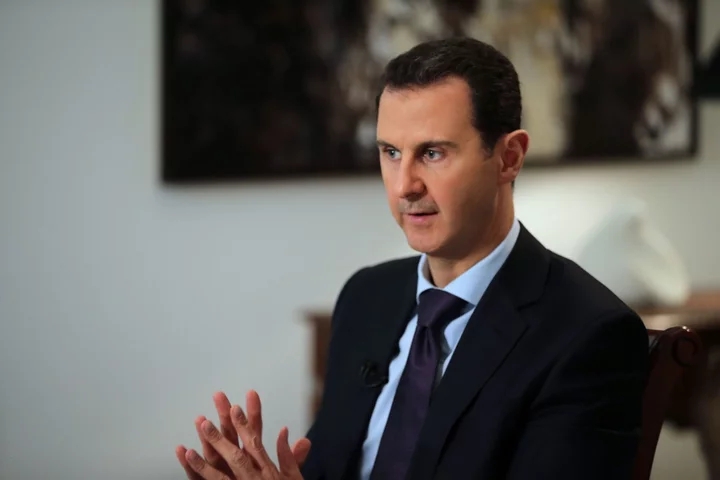If you walk in certain circles, it’s easy enough to believe that Puerto Rico has moved past devastating hurricanes and the largest municipal bankruptcy in US history.
Ritzy hotels and luxury restaurants are sprouting up along the island’s white-sand beaches and crystalline waters. Dinner for two can cost $500 at those high-end spots. Hedge fund executives and crypto exiles are moving in, lured by lucrative tax breaks.
But it’s the hum of privately owned generators that make those lifestyles possible, and shield this set of the island’s inhabitants from the reality experienced by the vast majority.
Puerto Rico’s aging and fragile power company was already bankrupt and in desperate need of repair when Hurricane Maria tore across the island in 2017. The storm caused more than $90 billion worth of damage and knocked out electricity in some areas for almost a year. Since then, the management of the Puerto Rico Electric Power Authority, or Prepa, has been put into private hands, but problems persist. Blackouts — even on sunny days — are depressingly common, and the island typically has the most expensive electricity of any US jurisdiction but Hawaii and Alaska.
The power woes are an additional burden on an island where 40% of the population lives in poverty and an affordability crisis has deepened, thanks in part because of the influx of wealthy residents. Real gross national product is still below 2016 levels amid hurricanes, earthquakes and mismanagement. It’s expected to shrink again this year, despite an influx of $120 billion in federal reconstruction aid. Meanwhile, pension payments and debt service take up 25% of the commonwealth’s budget even after bankruptcy.
That has Puerto Rico teetering on the edge of another possible fiscal crisis, exacerbated by Prepa’s debt burden and rising electricity rates that have led to protests in the streets.
“We need to get a sustainable debt load that Puerto Rico can pay and that consumers can bear,” Sergio Marxuach, policy director at Center for a New Economy, a San Juan-based fiscal watchdog group, said of Prepa. “That's the most important outcome from this whole process that has turned out to be incredibly hard and long and complicated.”
The commonwealth government hammered out its own bankruptcy deal in 2022, cutting about $22 billion in debt to about $7.4 billion. But slashing Prepa’s obligations — while the power grid is being put under private management and requires billions in repairs — has been more contentious.
Six years of negotiations have failed to resolve its almost $9 billion in debt, although Prepa and some bondholders are working on a tentative deal. The prolonged workout has tested the patience of US District Court Judge Laura Taylor Swain, who is overseeing the case.
Swain recently capped Prepa’s payout to bondholders at about $2.4 billion. However, any payment to creditors would be tacked onto the electricity bill of strapped residents through a so-called legacy charge, according to the current debt-cutting proposal from Puerto Rico’s financial oversight board, which is managing the utility’s bankruptcy. That’s what makes Prepa’s court proceedings so vital.
The island’s wealthy can mitigate rate hikes by adopting rooftop solar and battery systems, but those can cost several thousand dollars and are out of reach for most residents of an island with a $22,000 median household income. While the poorest may be eligible for energy subsidies, that would leave the middle class and business bearing the brunt of any new increases.
Ariel Torres Ramos, the president of the board of Selectos, a Puerto Rican supermarket chain with more than three dozen locations, said local businesses pay the price of government mismanagement. Commercial energy rates in Puerto Rico are already double the US average. Small businesses can’t absorb any additional hikes, and it’s increasingly difficult to pass along the costs to strapped consumers.
“They can’t keep shooting holes in the private sector,” he said. “That’s why we have to raise our voices and stop the abuse. They can’t keep squeezing us.”
A few miles from where billionaire John Paulson is building a luxury condominium — where a four-bedroom unit costs $4.7 million — activist Janet Cruz joined a few thousand others on a recent weekday to march on the governor’s palace in the tourist district of Old San Juan. The protestors were demanding that Prepa not repay a dime of the $8.3 billion it owes bondholders.
In her telling, US financial institutions got rich off of Puerto Rico bonds that corrupt local politicians issued despite constitutional debt limits.
“That debt was illegal but investors bought it anyway, knowing the risks,” said Cruz, who recently returned to Puerto Rico after living on the US mainland for a decade. “That debt is not ours and there’s no reason that we should repay it.”
By some measures, Puerto Rico’s economy is booming. A house in the upscale community of Dorado recently went on sale for $44 million, setting a new local record. Tourism is hitting all-time highs and the unemployment rate of around 6% is near a record low. Governor Pedro Pierluisi has called the numbers “real and irrefutable” proof that the economy is on the upswing.
Puerto Rico’s creditors also say the economy has turned the corner but the government is claiming hardship to avoid paying its long overdue debts.
“No bondholder ever forced the government to issue bonds,” said Daniel Solender, head of municipals at Lord Abbett & Co., which holds Prepa debt. “Now it’s all about how bondholders are asking for too much.”
One of the main motors of the economy now is $120 billion in federal funds, issued in the wake of the 2017 hurricane season, earthquakes and the pandemic. The money is the equivalent to New York state receiving $2 trillion, according to the board that manages the island’s finances.
“These funds represent a once-in-a-lifetime opportunity to rebuild the island’s economy,” Robert Mujica Jr, the board’s executive director, said at a recent public meeting. “But our analysis does not point toward sustainable economic growth if these funds are not invested to stimulate growth.”
And part of that equation is rebuilding the power grid and other infrastructure that will bolster the private sector.
As Cruz marched toward the governor’s mansion, she pointed to shops and buildings that used to be owned by Puerto Ricans but now are in the hands of mainlanders.
More than 5,000 people have moved to Puerto Rico since 2012 to take advantage of incentives previously known as Act 22, and now known as Act 60. The program allows newcomers to pay no federal income tax and zero taxes on dividend, interest and capital gains income — making it popular with investors and crypto holders. But those already living on the island aren’t eligible for all the perks, fueling the perception that rich mainlanders are getting special treatment that gives them purchasing power locals can’t compete with.
The us-versus-them tensions are only exacerbated by the fact that Puerto Rico has been a US possession since it was seized from Spain in 1898. While the island’s residents are American citizens and don’t pay federal tax on local income, they have limited rights: They can’t vote for president, have no vote in US Congress and are shortchanged on various federal programs.
In three referendums held since 2012, Puerto Ricans have said they want to be a full-fledged state. But turnout has often been low, and Congress, which ultimately decides the island’s status, has largely ignored the results.
Last month, on the 125th anniversary of the US occupation, graffiti went up on a main highway reading: “We see our future: it’s free of colonizers.”
As tourists sipped rum drinks on the cobbled streets of Old San Juan, taking pictures of the chanting and dancing demonstrators, Cruz said La Isla del Encanto only seems to work for visitors and outsiders — like the US bondholders.
“You look at the wages here and you look at the electricity bill and there’s simply no way to pay it,” she said. “This is the only place in the world where foreigners have more rights than the locals do.”
Read More:
Zero Taxes, Golf and Beach Houses Create a Crypto Island Paradise
Puerto Rico Aims to Woo Wall Street and Put Bankruptcy in Rearview Mirror
IRS Investigation Into Wealthy Americans Dodging Taxes Gets Help From Puerto Rico
Tax Breaks for Crypto Millionaires Stir Outrage in Puerto Rico

